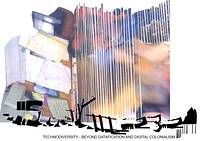Technodiversity

We must acknowledge that we are, most of us, deeply complicit in the order of data colonialism, whether we like it or not.
– Nick Couldry / Ulises Meijas
Technodiversity involves thinking about divergences within technological development (such as cultural histories), that is, to produce alternative technologies.
– Yuk Hui
Our lives are subject to processes of datafication through which big tech companies and governments extract data from us for profit or social and political control. The material thus collected is fed into the algorithms and artificial intelligence trained to monitor human behaviour. In digital capitalism, or ‘data colonialism’ life is appropriated as a resource and managed and traded in the form of data. This not only perpetuates existing inequality and discrimination, but also leads to new injustices and power imbalances. How can we resist data colonialism and produce alternative technologies?
The concept of technodiversity can provide insights that cannot be reduced to capitalist extraction. Technodiversity recognizes that technologies are temporally and spatially produced by different knowledge systems, ideologies, political interests, economic forces and cultural practices. This liberating perspective can create space for collectives, peoples and identities to produce and control their own data – no data, small data, indigenous data, more-than-human data, feminist data, queer data – and not be governed by Big Data and oppressive algorithms.
To safeguard subjectivity and the unmediated self, we must rethink our relationships with data, defying the extractive logic of contemporary data regimes. From the intersections of bodies, identities, digital technologies, artistic practices and activism, we can envision a data agency that is embodied and potentially subversive.
Studium Generale Rietveld Academie 2023-2024 will explore this with you and in collaboration with guest curators, theorists and artists. From January through March, we present talks, performances, film screenings, workshops and reading groups in the Fedlev auditorium, the Rietveld/Sandberg Library and other areas in the academy. We conclude with a multi-day conference and the Rietveld Uncut exhibition at Stedelijk Museum Amsterdam. There will be a special website, a printed lexicon and a digital Reader.
Key words: AFK, AI-Da, algorithmic catastrophe, algorithmic anxiety, biopolitics, Chat-GTP, Cloud Empire, cosmotechnology, cyborg, DALL-E, dark data, extractivism, fake news, ghosts in the machine, surveillance, technodiversity, glitches, prompting…
Project website: https://technodiversity.rietveldacademie.nl/
Preliminary programme at Rietveld academie:
Jan. 10 (Basicyear project I)
Jan. 17, 24, 31,
Feb. 7, 14, 28
Mar. 6, 13
Mar. 18 (Basicyear project II)
Techno Spectres, talks & performances, 14:00-15:30, Fedlev auditorium
Drawing on Water, Beamclub film screenings curated by Jo-Lene Ong and Bo Wang, 16:00-16:30, Fedlev Auditorium
A Soft Focus for Breathing Machines, reading group moderated by Jay Tan, 17:00-18:30, Rietveld/Sandberg Library
A Story to Tell – Voice and Authorship in the Age of AI, workshop led by Mariana Fernández Mora, 17:00-18:30
moon shine techno, lexicon written by CPR
On line Reader
Dedicated website by student Graphic Design Team Anastasija Diukova and Ji Won Choi
Who are you?, Basicyear workshop led by Julia Janssen
Conference-festival and Rietveld Uncut at Stedelijk Museum Amsterdam:
March 20, 21, 22
Guest curators: Karen Archey, Zach Blas. Meet the Masters with Taka Taka.